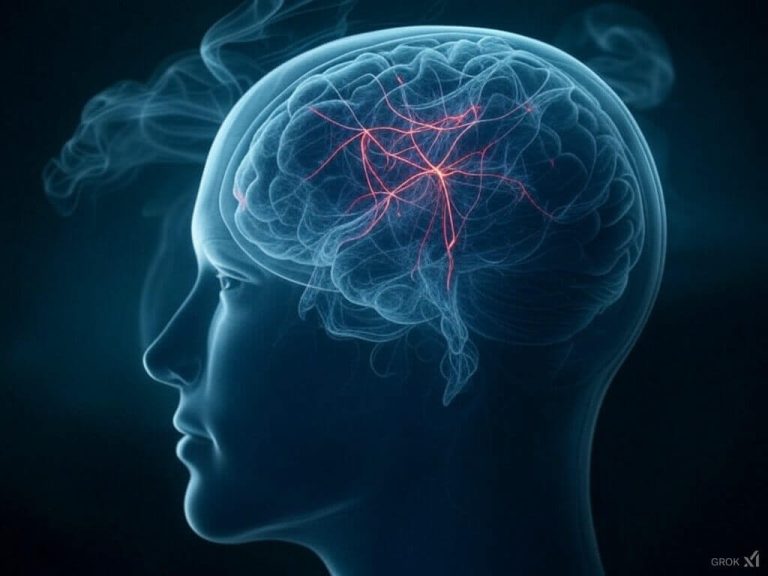Gamma-aminobutyric acid (GABA), the most common inhibitory neurotransmitter, is the mind’s master of calm, acting as the central nervous system’s peacekeeper to ensure our brains don’t spiral out of control.
While other common neurotransmitters, such as dopamine, increase our excitability and provide motivation and focus, GABA is there to hit the pause button, promoting relaxation and easing anxiety.
From managing stress levels to regulating how well we sleep, GABA is involved in many aspects of well-being, making it a magnet for scientific curiosity. While scientific literature surrounding GABA and its effects on mental health are still in the early stages, research has been looking at how certain foods and supplements can boost levels naturally in the hopes of providing medicinal benefits.
This article will explore everything you need to know about the science of GABA and how imbalances might be a cause of sleep, stress, and anxiety issues. We will also review what the latest scientific literature reveals about foods and supplementation that might elevate GABA naturally and how these mechanisms might work.
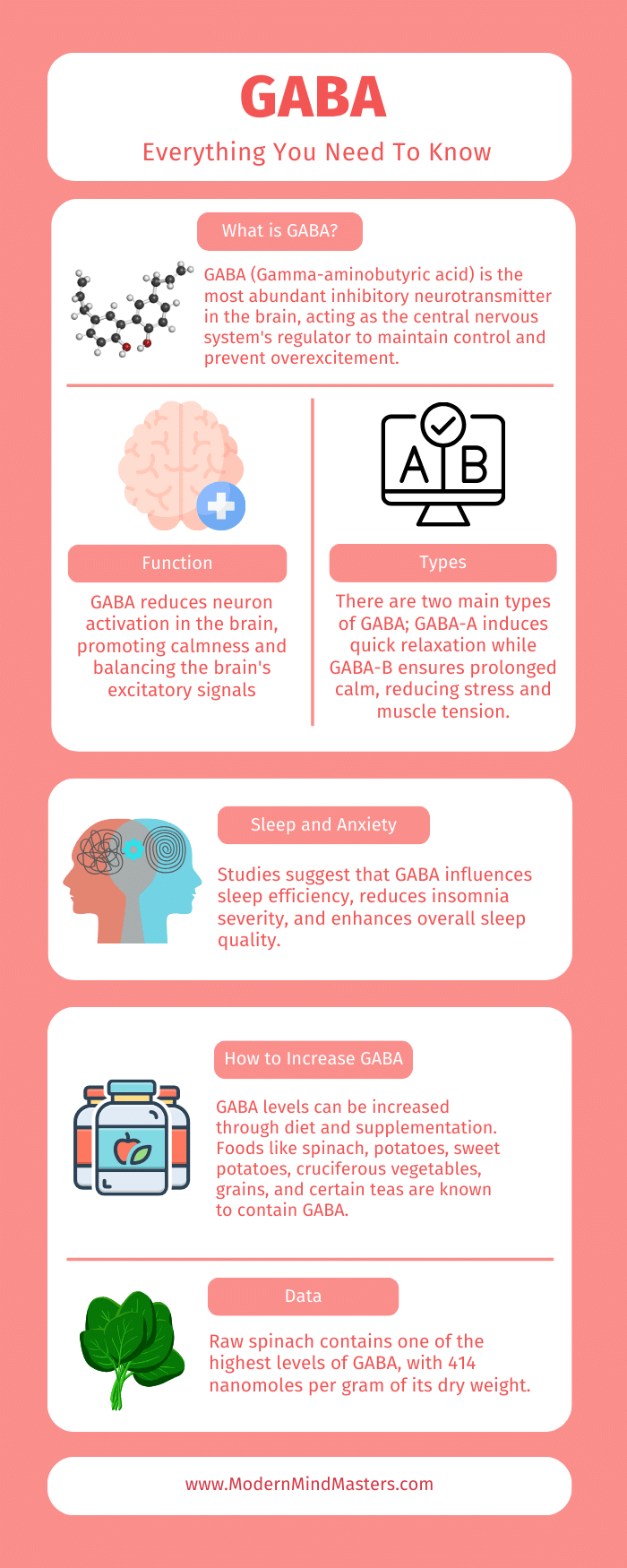
What is Gamma-Aminobutyric Acid (GABA)?
Gamma-aminobutyric acid (GABA) is the most abundant neurotransmitter in the brain. It transmits signals across a synapse from one neuron to another, enabling all neurons in the brain to pass on the correct signals quickly and efficiently.
Whereas dopamine, perhaps the most well-known neurotransmitter, is excitatory, meaning it promotes the firing of neurons and increases motivation and attention, GABA is an inhibitory neurotransmitter, meaning it decreases the likelihood that the neuron it acts upon will activate.
As a result, GABA tends to calm the brain, helping to maintain balance with excitatory neurotransmitters and regulate various brain functions by preventing over-excitement of neurons.
Interestingly, GABA only acts as an inhibitory neurotransmitter in mature brains. In fetal and neonatal brains, where neurons are immature, it is considered the major excitatory neurotransmitter, up until the point where glutamatergic synapses mature.
While GABA is the most abundant neurotransmitter in the brain, it is also found throughout the human body, specifically in the entire central nervous system (CNS) and in the pancreas where it is produced at relatively high levels in insulin-producing beta cells.
GABA-A and GABA-B Receptors
There are two main types of GABA receptors: GABA-A and GABA-B.
GABA-A receptors work quickly, opening channels that let negative ions into neurons, making them less likely to fire off signals. This action helps with immediate relaxation and is why anxiety and sleep medicines often target these receptors.
GABA-B, on the other hand, works more slowly. It doesn’t open ion channels directly but instead uses a series of steps inside the cell to produce a calming effect that lasts longer.
This type of receptor is involved in reducing long-term stress and muscle tension. So, where GABA-A is about quick and short effects like fast relaxation, GABA-B focuses on longer-lasting calmness and control over muscle movements.
What Does GABA Do?
GABA is an inhibitory neurotransmitter – it lessens a nerve cell’s ability to receive, create, or send chemical messages to other nerve cells. Whereas dopamine encourages the brain to increase its state of alertness, GABA, like serotonin, encourages it to quiet and calm down.
GABA has a calming effect on the brain and plays a major role in controlling anxiety, stress, and fear, although its exact function is determined by the neural circuit that it is inhibiting.
GABA also contributes to the regulation of respiration by influencing the brain region that controls the rate of breathing; an increase in GABA levels results in slower breathing rates.
In the spinal cord, GABA is involved in managing the processing of sensory signals necessary for coordinated motion by targeting specific neurons that regulate the delicate balance of sensory data, thereby facilitating fluid movements.
GABA is also critical to the functioning of the CNS, where 60–75% of all synapses are GABAergic (neurons that use GABA as their neurotransmitter).
Considering GABA’s extensive role as an inhibitory neurotransmitter and its broad presence, it’s not surprising that it influences a wide array of behaviors, including the regulation of anxiety and stress, control of circadian rhythms and sleep, improvement of memory, modulation of mood, and the perception of pain.
Because of its prominence, scientists and researchers are scouring all available data to utilize GABAergic treatments and medications to alleviate many such conditions.
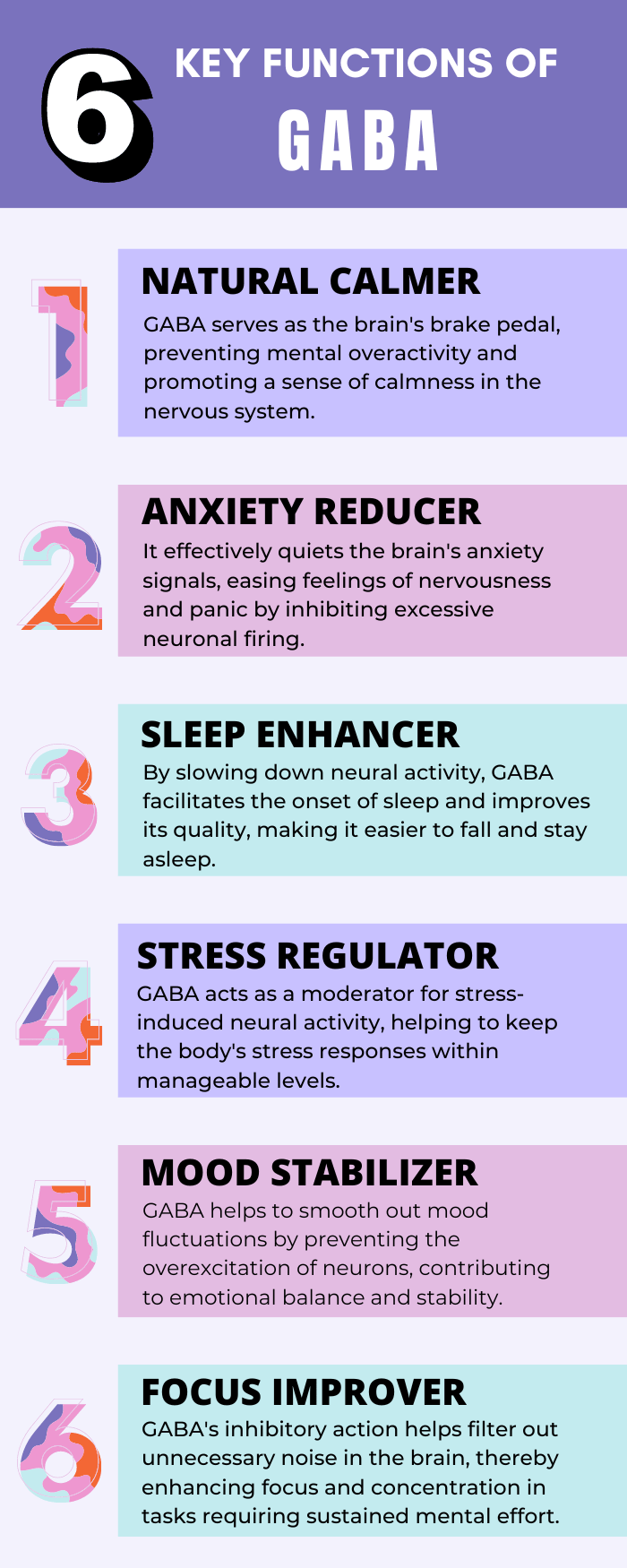
GABA and Sleep
Scour the internet on places like Reddit and you will find thousands of reports of the benefits of GABA supplementation on sleep. Despite what appears as strong anecdotal evidence, however, there is only limited clinical supportive evidence regarding the role of oral GABA intake on sleep improvement.
Three short studies, each lasting between 1 to 3 weeks with small groups of participants, looked into how taking biosynthetic GABA affects sleep quality in people with sleep issues.
In one of these studies lasting one week, taking a 100 mg GABA capsule (compared to a placebo) improved how refreshed participants felt upon waking. It also reduced the time it took to fall asleep and increased the amount of non-REM sleep.
In a more recent four-week study on middle-aged individuals with poor sleep, participants taking a 300 mg GABA tablet compared to a placebo experienced shorter times to fall asleep after the treatment.
The study also observed decreases in the percentage of N2 sleep (a stage of non-REM sleep), the severity of insomnia, and various measures of sleep quality, including overall sleep quality, time taken to fall asleep, and total sleep time, within the GABA group before and after treatment.
However, they did not find significant differences when comparing the GABA group directly with the placebo group, suggesting that a placebo effect may have been partly responsible for the improvements.
One study on healthy middle-aged people with poor sleep noticed that those eating GABA-enriched rice (16.8 mg of GABA in 150 g of rice daily) felt better upon waking up compared to those eating regular white rice (4.1 mg of GABA in 150 g of rice daily), especially by the 4th and 10th weeks of the study. However, the rice didn’t change how sleepy participants felt during the day.
Another study focused on healthy older adults for four weeks showed that taking biosynthetic GABA improved how quickly they fell asleep, their sleep continuity, morning alertness, and recovery from tiredness.
Yet, again, however, this study did not find significant differences between the GABA group and a placebo group, nor did they observe significant changes in deep non-REM sleep, REM sleep duration, and how often participants woke up.
While the data does indicate an increase in the efficiency of sleep after consuming GABA foods and supplements, there is yet to be strong evidence of improvement over placebo controls.
GABA for Stress and Anxiety
Low GABA levels, or problems with how GABA works, are linked to the development and continuation of stress and anxiety, both short-term and long-term.
Essentially, GABA-related neurons and chemicals help control the brain pathways in the amygdala, an area of the brain crucial for managing stress and anxiety under normal and abnormal conditions.
A recent study looked at how drinking GABA Oolong tea affects stress quickly and found that both GABA Oolong tea (with 2.01 mg of GABA per 200 ml of tea) and regular Oolong tea (with 0.25 mg of GABA per 200 ml of tea) made the time between two heartbeats longer for people with both low and high-stress levels (in theory, slowing heart has a calming effect).
However, GABA Oolong tea had a stronger effect on heart rate variability, making a larger difference in the time between heartbeats, especially in people with high stress compared to those with less stress.
Eating GABA rice (16.8 mg of GABA in 150 g of rice daily) for eight weeks made people feel calmer and less worried by the fourth week compared to eating white rice (4.1 mg of GABA in 150 g of rice daily), but these benefits didn’t last beyond that point.
Most other studies didn’t notice a big improvement in stress levels after taking a single dose of GABA, whether natural or made in a lab.
There’s mixed evidence on the benefits of using GABA for a longer time, and there aren’t many studies on it. Some improvements in sleep, like fewer disturbances, feeling better when waking up, falling asleep and staying asleep easier, feeling less drowsy in the morning, and recovering from tiredness, were seen only after using GABA for at least a week.
Overall, the evidence suggests that taking GABA for longer periods might be necessary to feel less stressed and sleep better, but more research is needed to confirm it.
Most studies found that effective doses for reducing stress range from 20 to 100 mg. Doses up to 30 mg tend to influence stress markers controlled by the autonomic nervous system, while a 100 mg dose impacts the central nervous system’s stress markers.
Although there’s limited research on natural GABA and its impact on stress, these effects might also come from other active ingredients found in foods that help reduce stress, such as l-theanine and epigallocatechin gallate (EGCG) found in tea.
Gaba and Alcohol
From a bit of “dutch-courage” to wildly overconfident, alcohol affects humans in many well-known ways. For a long time, people thought it worked by interfering with the fats in brain cells, but recent research has shown that alcohol mainly affects specific channels in brain cells that let ions in and out.
These channels are activated by chemicals like GABA, specifically the GABA-A receptors. When alcohol is present, it increases the effectiveness of GABA at the GABA-A receptor, meaning even more chloride ions enter the neuron, making it even less likely to fire.
When GABA activates these receptors, it makes brain cells less likely to fire signals, leading to the overall calming and sedative effects commonly experienced with alcohol consumption.
GABA and Glutamate
Like dopamine, glutamate is another excitatory neurotransmitter in the brain.
Despite having opposite effects on neuronal activity (GABA is inhibitory while glutamate is excitatory), GABA is synthesized directly from glutamate in a reaction catalyzed by the enzyme glutamic acid decarboxylase (GAD).
Glutamate is the primary excitatory neurotransmitter in the brain, playing a key role in neural communication, brain development, and plasticity—the brain’s ability to change and adapt in response to experience, crucial for many cognitive functions including learning, memory, and the overall regulation of the central nervous system.
Glutamate highlights how the brain can convert excitatory signals into inhibitory ones to automatically balance excitation and inhibition, a harmony crucial for normal brain function and mental health.
GABA Disorders, Side-effects, and Medical Conditions
Research from various areas of brain science shows that anxiety disorders often stem from dysfunctions in neurotransmitter levels, especially dopamine and serotonin. GABA is no different.
This study highlights the potential role of GABAergic dysfunction in Alzheimer’s disease (AD) and mild cognitive impairment (MCI), noting a pronounced decline in GABA levels in specific brain regions associated with aging, more so in AD patients.
It underscores neural network disturbances observed in early AD stages, suggesting dysregulated GABAergic signaling as a contributing factor. In light of the anticipated increase in dementia cases, a deeper understanding of GABAergic dysfunction could offer new avenues for mitigating dementia’s impact.
Drugs that affect GABA, a brain signal, have many uses. Benzodiazepines, a type of drug, work by attaching to a specific GABA receptor in the brain, making certain channels open more often.
This is perfect for things like anesthesia during surgery, controlling seizures, aiding sleep disorders, helping with alcohol withdrawal, reducing shaking from tremors, and relaxing tight muscles.
These drugs can equally be misused, however; alcohol, one of the most common substances that affects the mind, acts on the same GABA receptor. To treat alcohol withdrawal, doctors use drugs like benzodiazepines that change GABA activity.
While GABA is known to play a role in many mental health afflictions, its role is often overstated. A meta-analysis covering 40 studies on brain GABA levels across psychiatric disorders found that while brain GABA levels were lower in autism spectrum disorder (ASD) and depressed MDD patients, no association was found for schizophrenia, bipolar disorder, panic disorder, PTSD, and ADHD, compared with controls.
GABA and Autism
Of all of the reviews conducted to date, perhaps the most interesting is the possibility of GABA dysfunction as a contributory factor of Autism spectrum disorder (ASD).
GABA is highlighted as being crucial to ASD for two main reasons: mutations in GABA receptors can mimic ASD symptoms, and certain ASD-related genes are involved in GABA signaling.
Some treatments targeting GABA receptors have shown promise in alleviating ASD symptoms in animal models and early clinical trials, although much more research is needed.
While there is evidence of GABAergic dysfunction in ASD, the exact relationship between GABA signaling and ASD is complex, specifically the changing role of GABA from excitatory to inhibitory during brain development, which could affect neuronal networks and the balance of excitation and inhibition in the brain, potentially contributing to ASD.
How to Increase GABA
Since a deficiency in GABA has been potentially associated with anxiety, mood, and sleep disorders, to name just a few, the focus has naturally turned to ways we might increase GABA levels as a way to mitigate them.
If only it were as easy as taking a pill to solve all your problems. Up until a few years ago, it was believed that GABA couldn’t pass through the blood-brain barrier (BBB), a selective filter that protects the brain by blocking some substances from entering the blood.
While opinions still vary on whether GABA can cross this barrier, recent studies point to special transport systems in the brain that may allow more significant amounts to pass through.
Since GABA is also found in the digestive system, some suppose that it might affect the brain indirectly through connections between the gut and brain (known as the gut-brain axis).
Although it has been shown that blood GABA levels increased 30 minutes after ingesting oral GABA, it’s not known if oral GABA intake would increase brain GABA concentrations.
Currently, the best science can say is that there is some evidence that ingesting GABA, whether through food or supplements, increases GABA in both the blood and brain, but the data is limited, and we don’t know why or through which mechanisms they might work.
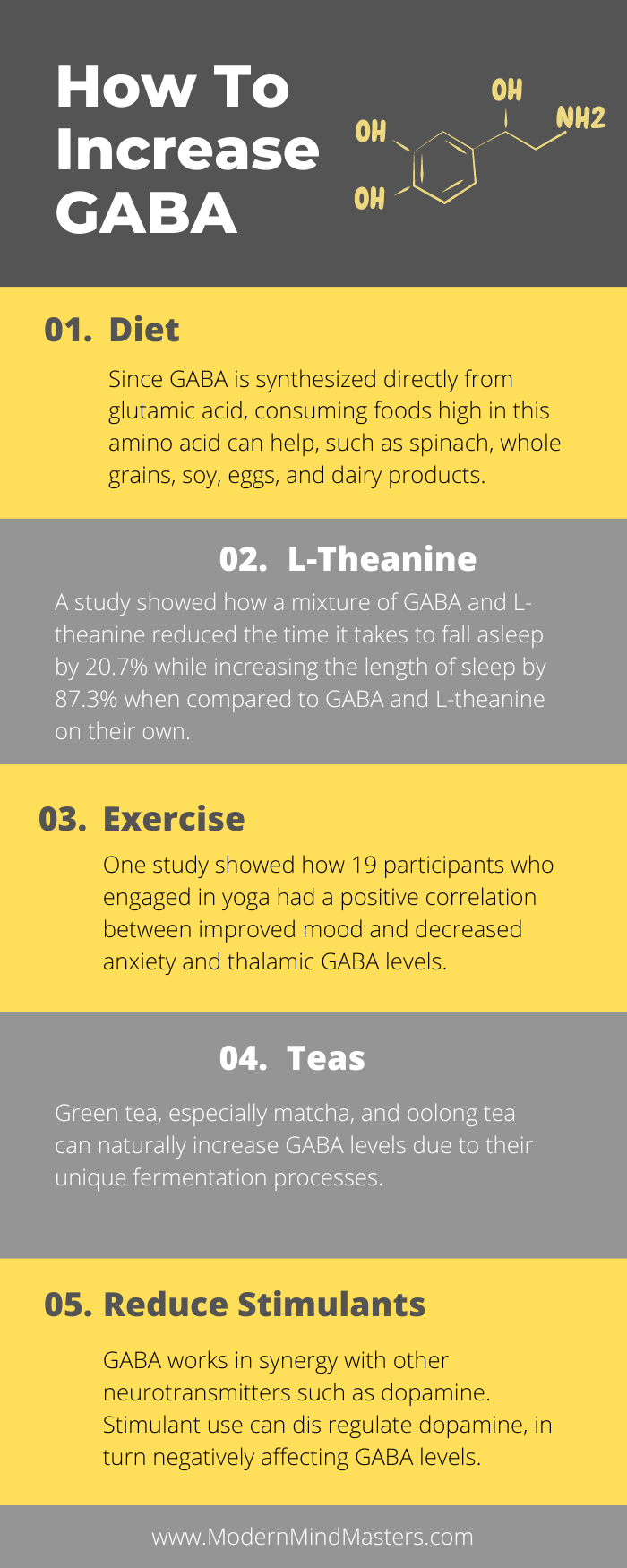
Foods that Increase GABA
GABA also exists naturally in various foods, especially among plants, and can be obtained in sufficient quantities from a balanced diet.
Some researchers discovered that raw spinach has one of the highest levels of GABA, with 414 nanomoles per gram of its dry weight, followed by potatoes, sweet potatoes, and cruciferous vegetables like kale and broccoli. Shiitake mushrooms and chestnuts also have a lot of GABA.
Grains from the Gramineae family, like oats, wheat, barley, and various types of rice (white, black, brown, and red), also provide a significant amount of GABA.
Interestingly, sprouts from certain plants like lupin, adzuki bean, and other beans such as soybean, common bean, and pea have been found to have more GABA compared to their raw form, showing that the stage of food development can be just as important as the type of food.
GABA is also commonly consumed in teas, specifically green, black, and oolong.
While these foods are known to contain GABA, research is still limited in showing how much can pass the blood-brain barrier and to what extent this can induce change. Seeing as how these foods are all healthy and will contribute to a balanced diet, there is little harm in trying, so long as you don’t overdo it.
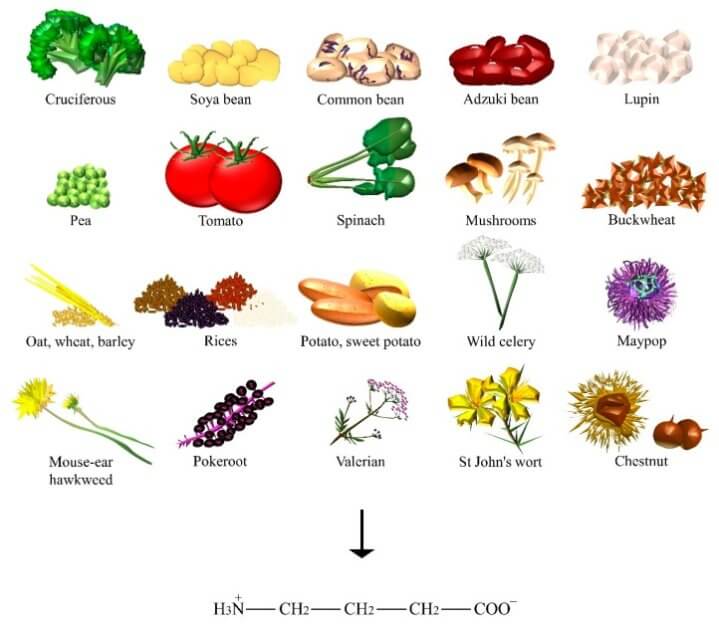
Supplements to Increase GABA
Since most supplements have little to no side effects, and often provide other benefits on health, there is little harm in trying to increase supplementation through GABA for those that feel it necessary.
L-theanine and GABA
L-theanine, a naturally occurring amino acid first discovered in green tea, is a well-known anti-anxiety supplement with proven relaxation benefits. It was previously shown that l-theanine intake increased serotonin and dopamine levels, in turn regulating GABA levels in the brain, presumed to be the reason for its known benefits on sleep.
This study, however, showed how a mixture of GABA and L-theanine (100/20 mg/kg) reduced the time to fall asleep by 20.7 and 14.9% and increased the length of sleep by 87.3 and 26.8%, respectively, compared to taking GABA or L-theanine by themselves.
While a mix of GABA and L-theanine of dosages between 300-500 mg was shown to be effective for sleep, these dosages are on the higher end of what is typically suggested and were performed under medical supervision.
It is recommended to start with lower dosages of at least 100 mg (higher depending on your body weight) and adjust upwards if necessary. As always, supplementation affecting neurotransmitters should be discussed with a medical professional.
Other Supplements
Magnesium might also help reduce anxiety by boosting the availability of GABA by limiting the release of its excitatory counterpart glutamate, helping to regulate the delicate balance between GABA and glutamate that reduces anxiety disorders.
Other natural supplements that have shown potential for other depressive and anxiety disorders, where GABA regulation may play a part, include taurine, ashwagandha, passionflower, and kava.
Conclusion
Gamma-aminobutyric acid (GABA) plays a pivotal role as the primary inhibitory neurotransmitter in the human central nervous system, maintaining the delicate balance with its precursor, glutamate, between neuronal excitation and inhibition.
This balance is crucial for regulating a myriad of physiological processes, including mood, anxiety, stress, and sleep, with the presence of GABA across different parts of the body, including the brain, pancreas, and central nervous system, underscoring its importance in overall health and well-being.
With its calming effect, GABA serves as a fundamental element in managing stress and anxiety and facilitating sleep, making it a subject of intense study for potential therapeutic applications.
The ability of certain foods and fermentation processes to increase GABA levels offers intriguing possibilities for dietary strategies to enhance health naturally. Additionally, the ongoing research into GABA supplementation and its effects on stress, anxiety, sleep quality, and neurological disorders highlights the potential of GABAergic interventions in improving mental health.
Despite the need for more research to better understand the mechanisms and effectiveness of GABA in various conditions, its significant role in the human body is undeniable, offering promising avenues for future health innovations and therapies.
FAQs
What is GABA?
GABA is the primary inhibitory neurotransmitter in the brain, essential for maintaining balance by preventing over-excitement of neurons and promoting relaxation, thus playing a critical role in managing anxiety, stress, and sleep.
What are the benefits of taking GABA?
While some evidence suggests GABA supplements can improve sleep quality, stress, and anxiety, scientific studies offer limited support, with some showing benefits in sleep efficiency but lacking strong evidence against placebo effects.
How to increase GABA naturally
Research into boosting GABA levels through diet or supplements is ongoing, with foods like spinach and supplements like L-theanine showing potential. GABA containing teas, such as oolong tea, also show evidence of increasing GABA.

